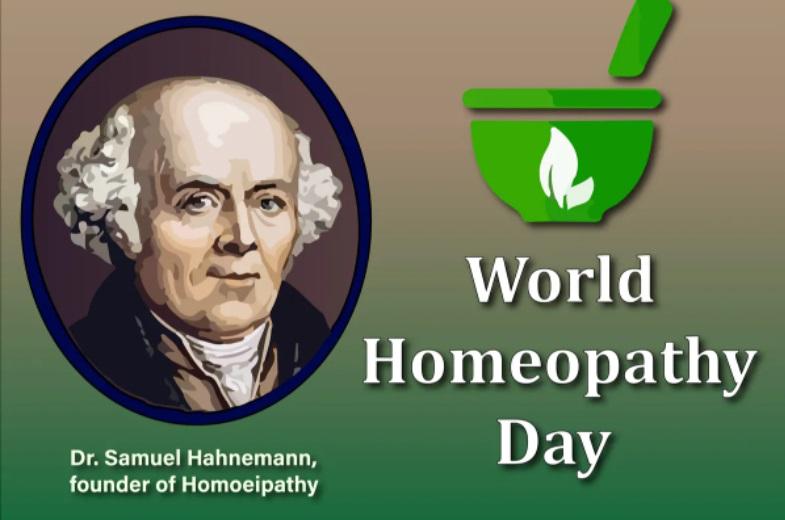Table of Contents
- World Homoeopathy Day 2024: Theme
- History of Homoeopathy
- World Homeopathy Day 2024: Significance
- World Homoeopathy Day 2024: Advantages
- Why is World Homoeopathy Day celebrated?
World Homoeopathy Day 2024: It is celebrated on 10 April to mark the birth anniversary of the founder of Homoeopathy, Dr. Samuel Hahnemann. Let us have a look in detail at the World Homeopathy Day, 2024 theme, its history, and some key facts about homoeopathy.
The goal of homoeopathy is to address the whole body, including their character, way of life, hereditary predispositions, and disease history, to give therapy. Since every individual is particular in their own specific manner, homoeopathic cures are modified to take care of every individual's particular requirements.
World Homoeopathy Day 2024: Theme
The theme for World Homeopathy Day is “Homeoparivar: One Health, One Family.
World Homeopathy Day 2023 is being celebrated on the theme, 'One Health One Family'.
The theme of this scientific convention in 2022 is ‘Homoeopathy: People’s Choice for Wellness’.
The theme of 2020 was "Enhancing the Scope of Homoeopathy in Public Health."
This year, the Central Council for Research in Homeopathy is organising a webcast on April 10 and 11. The event will witness the President of India, Droupadi Murmu, and Secretary of Ministry of Ayush, Vaidya Rajesh Kotecha as Chief Guest and Guest of Honours, respectively on the inaugural ceremony. It is going to be organised at the Yashobhoomi (India International Convention and Expo Centre), New Delhi.

History of Homoeopathy
Homoeopathy does not use drugs or surgery. It is based on the belief that everyone is an individual, has different symptoms and should be treated accordingly. Homoeopathy first time gained prominence in the 19th century after extensive pioneering work by the German physician and chemist Samuel Hahnemann (1755-1843). But its origin date back to the 5th century BC, when the 'father of medicine Hippocrates introduced homoeopathy remedies to his medicine chest.
It is said that it was Hippocrates who understand the disease, and how it affects our bodies, rather than his remedies, that made his discoveries homoeopathic. He told that it is necessary to understand the symptoms of each individual, how they reacted to diseases and their power of healing is important in diagnosing and treating the illness. This understanding of the individual became the basis of homoeopathy today. Let us tell you that after Hippocrates, homoeopathy was largely neglected until Hahnemann reinvented it in the late 18th century. At that time disease was rampant, and medical treatments became increasingly violent and invasive.
Hahnemann found clinical medicine totally unacceptable. He worked hard on medicines and chemistry and protested against poor hygiene which was the main reason that was accelerating the spread of disease. He was against brutal medical practices and the use of strong medications that cause terrible side effects. But his disillusionment finally led him to give up medicine to work as a translator. He was translating "A Treatise on Materia Medica" by Scottish physician Dr William Cullen, Hahnemann discovered something in the medical field that made him the true founder of Homoeopathy.
More News: top 10 news headlines 2024
Due to the astringent properties of the quinine, Cullen told that it was an effective treatment for malaria. Hahnemann also knew about it as it helps to fight malaria, but he was in doubt about its astringent properties. He did research and made several investigations. He dosed himself with quinine for some days and noted his reactions. He was surprised that one by one, he developed the symptoms of malaria but he was not suffering from it. Each time he takes the dose of quinine and symptoms recurred.
On the other side he noticed that when he did not take the medicine, the symptoms went away. Then he believed that it was the ability of quinine to cause symptoms of malaria that made it such an effective treatment. To illustrate his theory he conducted some tests known as "provings" on several volunteers and noted each person's reactions. He repeated the same tests with others and with popular medicines like arsenic, etc. He noted the same as Hippocrates discovered that symptoms and healing responses depend on the individual.
The symptoms that were common among testers, he called the keynote or first-line symptoms. Those symptoms that were less common were called Second-line symptoms and very rare symptoms as third-line symptoms.
From the symptoms and testing, he built a drug picture for each substance he tested. The next stage of Hahnemann's is to build a "symptoms picture" of each patient before prescribing the treatment. He further discovered that the more and more symptoms from the patient's likes and dislikes, what made them better or worse, the more accurately he will be able to prescribe a suitable remedy. This drug picture of Hahnemann's is used today in prescribing the best homoeopathy treatment.

World Homeopathy Day 2024: Significance
The significance of World Homoeopathy Day lies in raising awareness about the benefits of homoeopathy and its potential as a complementary and alternative medicine (CAM) option. It provides an opportunity to showcase the effectiveness of homoeopathy in treating various health conditions and highlights the need for further research and development in the field. Additionally, it serves as a platform to promote collaboration among homoeopathic practitioners, researchers, and policymakers to advance homoeopathy as a safe and effective treatment option for patients worldwide.
World Homoeopathy Day 2024: Advantages
Homeopathy provides a holistic way to healing, and dealing not just with physical symptoms but it takes into consideration individual personality traits, lifestyle factors, and hereditary predispositions.
Its non-toxic and customized cure makes it a protected and viable option in contrast to traditional medication. Moreover, homeopathy's eco-friendly nature lines up with the worldwide concerns on sustainability and environmental conservation.
Read Also: Decoding the Dynamics: RCB Strategy Unveiled for IPL 2024
Why is World Homoeopathy Day celebrated?
It is celebrated to raise awareness about homoeopathy and to improve the accessibility to homoeopathy. It is also important to understand future strategies required to develop homoeopathy on a larger scale and its challenges. It is required to focus on the quality of education, enhancing the success rate of an average practitioner.
Therefore, Homeopathy is a medical system that believes that the body can cure itself. Practitioners of homoeopathy use tiny amounts of natural substances, like plants and minerals. They believe that these stimulate the healing process. World Homoeopathy Day is celebrated on 10 April to raise awareness about homoeopathy. Also, the day commemorates the birthday of Samuel Hahnemann, the founder of Homoeopathy.
The goal of World Homeopathy Day is to increase public awareness of homoeopathy by bringing together practitioners, enthusiasts, and supporters from all around the world. It allows us to concentrate on education quality, improving the success rate of the typical homoeopathic practitioner, so homoeopathy can be the preferred treatment option in every household.
Other Popular News Post:
Maharashtra Government Bills | Haryana Assembly Elections | IndiGo | Haryana and J&K Poll Results | Karachi Blast | Chennai Air Show | Jammu and Kashmir Election Results | Haryana,Jammu and Kashmir Election Results | Bavdhan Helicopter Accident | Swachh Bharat Mission | Israel's Air Defense System | Sadhguru's Isha Yoga Center | Nagarjuna | Google Data Centres in India | Deputy Speaker Narhari Zirwal | Fake Interview with Amitabh Bachchan
Explore other popular Posts:
Blog | News | Entertainment | Education | Sports |
Technology | Cryptocurrency | Stock | Home | Sitemap





